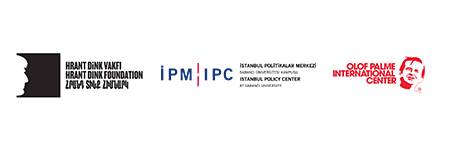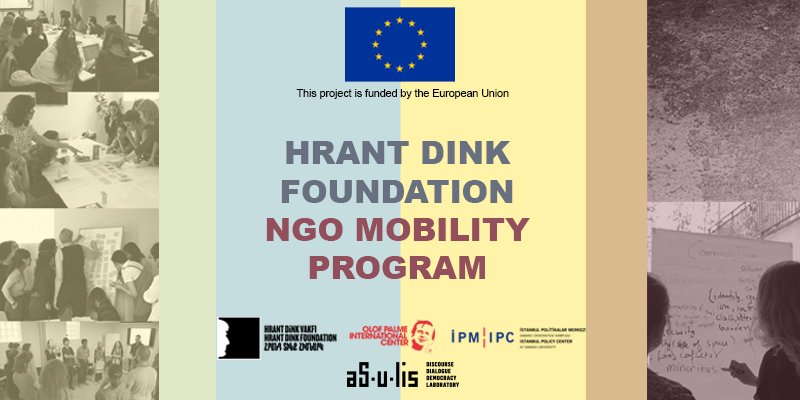Call for applications is now open for the NGO Mobility Program!
Deadline for the applications is January 15, 2020, 18:00
The NGO Mobility Program, run by Hrant Dink Foundation in collaboration with Olof Palme International Center and Istanbul Policy Center, financially supported by the European Union is waiting for your applications.
This program aims to provide an opportunity to the CSO professionals from Turkey to gain experience, benefit from innovative methodologies and from best practices by working at CSOs in Europe, USA, Africa, South America and Asia. The NGO Mobility Program aims at building bridges between international right based organizations and contributing to a robust, innovative and creative civil society.
Candidates will have the opportunity to select from dozens of prestigious host organizations in the non-profit sector to have a short-term experience in a wide range of institutions working on human rights, minority rights, refugee rights, LGBTI rights, youth and labour rights, conflict resolution,memory, freedom of expression, cultural studies, media ,art and cultural heritage.
The program will enable the fellows to take part in a range of projects and events organized by right based organizations, develop their skills, benefit from innovative methods for tackling discrimination, raising awareness and advocacy.
The duration of the program is 8 to 12 weeks and 16 fellows will be selected for the program. The applications will be received online and in English.
Application Documents:
Program guideline
Application form
NGO mobility program regulation
Monthly allowances for countries
Specific Dates and Deadlines for the Program:
Call for applications: 9 December 2019
Application deadline: 15 January 2020
Fellows announcement: 29 February 2020
Program duration: 1 April - 30 November 2020
Contact
For further questions please contact Tütengül Küçüker, Fellowship Coordinator
E-mail: This email address is being protected from spambots. You need JavaScript enabled to view it.
| HOST ORGANIZATIONS |
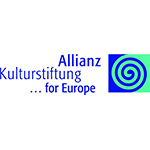 The Allianz Kulturstiftung is a not-for-profit cultural foundation for Europe. The aim of the Foundation is to strengthen cohesion in Europe using the tools of art and culture. As a promoter of social change, the Foundation is geared towards achieving impact and it operates independently. The head office is located in Berlin and the organisation plays an operational role as well as providing funding.
The Allianz Kulturstiftung is a not-for-profit cultural foundation for Europe. The aim of the Foundation is to strengthen cohesion in Europe using the tools of art and culture. As a promoter of social change, the Foundation is geared towards achieving impact and it operates independently. The head office is located in Berlin and the organisation plays an operational role as well as providing funding. The Foundation is committed to translocal art and culture projects in Europe and the Mediterranean region. Over the coming years, it will focus its strategic work on the following thematic areas. It will promote an open society while adopting a decentralised approach to Europe and driving forward digitalisation for the common good.
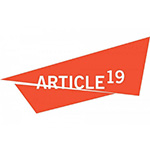 ARTICLE 19 works for a world where all people everywhere can freely express themselves and actively engage in public life without fear of discrimination.
ARTICLE 19 works for a world where all people everywhere can freely express themselves and actively engage in public life without fear of discrimination. They do this by working on two interlocking freedoms which set the foundation for all their work:
• The Freedom to Speak concerns everyone’s right to express and disseminate opinions, ideas and information through any means, as well as to disagree with, and question power-holders.
• The Freedom to Know concerns the right to demand and receive information by power-holders for transparency, good governance and sustainable development.
When either of these freedoms comes under threat, either by the failure of power-holders to adequately protect them, ARTICLE 19 speaks with one voice, through courts of law, through global and regional organisations, and through civil society wherever we are present.
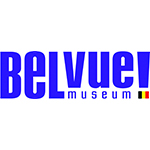 The BELvue Museum in Brussels, managed by the King Baudouin Foundation, presents a modern exhibition on Belgium and its history. The BELvue also regularly hosts temporary exhibitions and organizes many activities for the general public. eduBEL, the educational service of the BELvue offers educational and recreational activities for schools and vulnerable groups.
The BELvue Museum in Brussels, managed by the King Baudouin Foundation, presents a modern exhibition on Belgium and its history. The BELvue also regularly hosts temporary exhibitions and organizes many activities for the general public. eduBEL, the educational service of the BELvue offers educational and recreational activities for schools and vulnerable groups.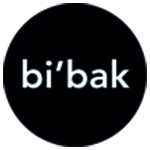 bi’bak (Turkish: have a look) is a project space based in Berlin, with a focus on transnational narratives, migration, global mobility and their aesthetic dimensions. bi’bak’s programme examines diverse disciplines in art, academics, and community development, including film screenings, exhibitions, workshops as well as music events and culinary excursions. bi'bak is a non-profit organization.
bi’bak (Turkish: have a look) is a project space based in Berlin, with a focus on transnational narratives, migration, global mobility and their aesthetic dimensions. bi’bak’s programme examines diverse disciplines in art, academics, and community development, including film screenings, exhibitions, workshops as well as music events and culinary excursions. bi'bak is a non-profit organization. Founded in 2014 by the artists and curators Malve Lippmann and Can Sungu. The curated film programme, bi'bakino, as well as the audio programme bi'bakaudio aims to show transnational, postcolonial and postmigrant perspectives. Experts invited from the fields of art, film and academics will enable a more differentiated, explicitly non-European view of society and cultural history. bi'baxchange offers a platform for cultural actors and projects, initiating cross-border collaborations. bi'bakwerk works with innovative concepts for art education, which aim for an equal participation and the exchange of ideas, knowledge and creativity. bi'bak's research-based exhibitions focus on widely neglected narratives and perspectives that are crucial for a comprehensive understanding of socio-political and socio-economic contexts worldwide. bi'bak was awarded by the Berlin Senate for Culture and Europe for its project space in 2017.
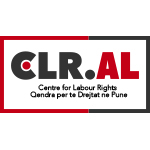 The Center for Labour Rights (CLR) is an Albanian non for profit organization, established from a group of professionals and activists highly interested in labour rights as unbreakable part of human rights, on workers’ dignity and education and respect on the principles of decent work in Albania.
The Center for Labour Rights (CLR) is an Albanian non for profit organization, established from a group of professionals and activists highly interested in labour rights as unbreakable part of human rights, on workers’ dignity and education and respect on the principles of decent work in Albania. With the mission to support employees and engage in programs and projects that enables them to exercise their rights in order to improve working and living conditions; to foster and defend the right of association and to promote decent work, social justice and equality for sustainable democratic development of the Albanian society, CLR works with employees, trade unions, workers' councils, safety and work health councils representatives, civil society organizations, various interest groups, state institutions, state and private universities, employers’ organizations or/and business entities, other state or private institutions of research and education in Albania and in the region.
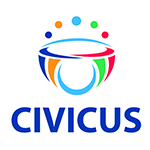 Founded in 1993 and based in South Africa since 2002, CIVICUS is a global alliance of civil society organisations and activists dedicated to strengthening citizen action and civil society throughout the world. In this strategic period (2017-2022), they will work to strengthen citizen action and civil society toward a more just, inclusive, and sustainable world by:
Founded in 1993 and based in South Africa since 2002, CIVICUS is a global alliance of civil society organisations and activists dedicated to strengthening citizen action and civil society throughout the world. In this strategic period (2017-2022), they will work to strengthen citizen action and civil society toward a more just, inclusive, and sustainable world by: 1. Defending civic freedoms and democratic values.
2. Strengthening the power of people to organise, mobilise, and take action.
3. Empowering a more accountable, effective and innovative civil society.
These goals are informed by their belief that people-powered and collective action is at the centre of transformative change, as well as their assessment that three concrete challenges that CIVICUS is in a strong position to address are: the global emergency on civic space; the growing democratic deficit; and shortfalls in civil society practice.
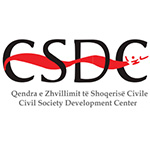 The mission of CSDC Durrës is to inform, empower, and mobilize civil society actors - organizations, community groups, trade unions, individuals, and media - through promoting their development, coordinating, networking, and collaborating. CSDC Durrës bridges the gap between citizens, local governments, and civil society stake holders by effectively fullling the roles of: Advocate - Facilitator – Coordinator.
The mission of CSDC Durrës is to inform, empower, and mobilize civil society actors - organizations, community groups, trade unions, individuals, and media - through promoting their development, coordinating, networking, and collaborating. CSDC Durrës bridges the gap between citizens, local governments, and civil society stake holders by effectively fullling the roles of: Advocate - Facilitator – Coordinator.CPJ's work is based on its research, which provides a global snapshot of obstructions to a free press worldwide. CPJ denounces press freedom violations, meets with heads of state and high-ranking officials, spearheads or advises on diplomatic efforts, and works with other organizations to ensure that justice prevails when journalists are imprisoned or killed. CPJ also provides comprehensive, life-saving support to journalists and media support staff working around the world through up-to-date safety and security information and rapid response assistance.
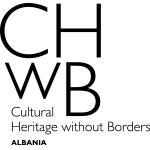 They design and implement innovative strategies and manage various interventions on the ground, by using cultural heritage as a burgeoning creative force for reconciliation, justice & human rights and sustainable human development. This is achieved with a bottom-up approach, promoting both their partners’ and beneficiaries’ sense of ownership and engagement, as they believe development is sustainable only if it comes from within communities themselves.
They design and implement innovative strategies and manage various interventions on the ground, by using cultural heritage as a burgeoning creative force for reconciliation, justice & human rights and sustainable human development. This is achieved with a bottom-up approach, promoting both their partners’ and beneficiaries’ sense of ownership and engagement, as they believe development is sustainable only if it comes from within communities themselves. Their partners are civil society organizations, cultural and education institutions, international development agencies, private sector organizations and governmental agencies on all levels.
They work with all members of society without discrimination on the basis of race, gender, religion, ethnicity, sexual orientation, political affiliation or physical, mental, emotional or learning ability.
CHwB Albania relies on the competence of a multidisciplinary team that combines experience, passion, creativity and determination to make a difference in Albania, the Western Balkans and beyond.
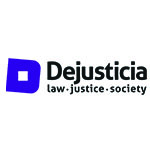 Dejusticia is a think-do tank based in Bogotá known for its leadership in public debates, research work that is often cited by academia and government, and its norm-changing litigation cases in Colombia and in the Latin American region. They promote positive social change by producing rigorous studies and fact-based policy proposals; carrying out effective advocacy campaigns or litigating in the most impactful forums; and designing and delivering education and capacity-building programs. At Dejusticia, they believe that academic work can be committed to social justice and can contribute to effect change, and they have an “amphibious” approach to our work: they take deep dives in academic and policy-design research and writing with a clear sense of how such work can and will have an impact on our direct action and advocacy. Dejusticia’s unique trait—being a combination of a think tank that undertakes rigorous academic research and an activist NGO that leads high-impact litigation, advocacy and training of key actors in the social change field—has made it an important reference point and expert voice both within Colombia and also internationally, with a distinct Global South perspective. In 2017, Dejusticia was awarded by Semana, the Leadership and Democracy Foundation and Telefónica the coveted “Collective Leadership Award” in Colombia, and the 2018 Significant Legal Ruling Award by Columbia University’s Global Freedom of Expression Award for its victory in the “Sugary Drinks” decision by the Constitutional Court of Colombia.
Dejusticia is a think-do tank based in Bogotá known for its leadership in public debates, research work that is often cited by academia and government, and its norm-changing litigation cases in Colombia and in the Latin American region. They promote positive social change by producing rigorous studies and fact-based policy proposals; carrying out effective advocacy campaigns or litigating in the most impactful forums; and designing and delivering education and capacity-building programs. At Dejusticia, they believe that academic work can be committed to social justice and can contribute to effect change, and they have an “amphibious” approach to our work: they take deep dives in academic and policy-design research and writing with a clear sense of how such work can and will have an impact on our direct action and advocacy. Dejusticia’s unique trait—being a combination of a think tank that undertakes rigorous academic research and an activist NGO that leads high-impact litigation, advocacy and training of key actors in the social change field—has made it an important reference point and expert voice both within Colombia and also internationally, with a distinct Global South perspective. In 2017, Dejusticia was awarded by Semana, the Leadership and Democracy Foundation and Telefónica the coveted “Collective Leadership Award” in Colombia, and the 2018 Significant Legal Ruling Award by Columbia University’s Global Freedom of Expression Award for its victory in the “Sugary Drinks” decision by the Constitutional Court of Colombia. Within Colombia, Dejusticia has been at the forefront of issues such as transitional justice, drug policy, environmental justice and climate change, indigenous peoples’ rights, judicial reform, rule of law and anti-corruption, technology and transparency, socioeconomic justice, and gender equality. Internationally, it has been doing work on climate change, indigenous peoples rights and racial equality, reopening of the space for civil society, migration, global drug policy, business and human rights, privacy and transparency, and economic, social, and cultural rights.
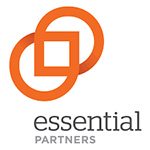 Their mission is foster constructive dialogue wherever conflicts are driven by differences of identities, beliefs, and values. Essential Partners has worked for three decades to facilitate conversations and equip people using our approach to dialogue. They bring a method that is applicable and adaptable to a wide variety of contexts. Our method, Reflective Structured Dialogue (RSD), relies on preparation, structure, questions, facilitation, and reflection to enable people to harness their capacity to have the conversations they need to have.
Their mission is foster constructive dialogue wherever conflicts are driven by differences of identities, beliefs, and values. Essential Partners has worked for three decades to facilitate conversations and equip people using our approach to dialogue. They bring a method that is applicable and adaptable to a wide variety of contexts. Our method, Reflective Structured Dialogue (RSD), relies on preparation, structure, questions, facilitation, and reflection to enable people to harness their capacity to have the conversations they need to have.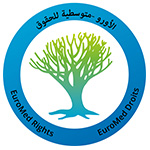 Rooted in civil society, EuroMed Rights seeks to develop and strengthen partnerships between NGOs in the Euro-Mediterranean region, advocate for human rights values and develop capacities in this regard. In 1995, a group of human rights activists from both sides of the Mediterranean believed that they could make a positive impact on the human rights situation by creating a civil society network, linking up the Barcelona Process to Human Rights NGOs operating in the region.
Rooted in civil society, EuroMed Rights seeks to develop and strengthen partnerships between NGOs in the Euro-Mediterranean region, advocate for human rights values and develop capacities in this regard. In 1995, a group of human rights activists from both sides of the Mediterranean believed that they could make a positive impact on the human rights situation by creating a civil society network, linking up the Barcelona Process to Human Rights NGOs operating in the region. Having established its credibility on both sides of the Mediterranean, EuroMed Rights is now widely recognised as a key organisation for civil society and decision-makers alike. EuroMed Rights' vision is to serve as a leading human rights forum in the region, and a major source of knowledge and action on human rights and democratic reform.
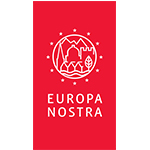 Since it was founded in 1963, Europa Nostra has been raising awareness on the extraordinary value of cultural heritage for Europe and its inhabitants; advocating for cultural heritage towards policy-makers at all levels; celebrating excellence in heritage protection, research and education, and mobilising to save Europe’s endangered heritage. Through these closely linked workstreams, Europa Nostra’s ultimate goal is to contribute to preserve our shared past to take lessons for the present and to inspire new visions for the future of Europe.
Since it was founded in 1963, Europa Nostra has been raising awareness on the extraordinary value of cultural heritage for Europe and its inhabitants; advocating for cultural heritage towards policy-makers at all levels; celebrating excellence in heritage protection, research and education, and mobilising to save Europe’s endangered heritage. Through these closely linked workstreams, Europa Nostra’s ultimate goal is to contribute to preserve our shared past to take lessons for the present and to inspire new visions for the future of Europe. For over 50 years, Europa Nostra has remarkably contributed to shape and give voice to the ever-growing civil society movement for cultural heritage in Europe. Bringing together more than 340 member organisations, 1,000 individuals and with the support of a wide range of partners - public bodies, institutions at all governance levels, international organisations, NGOs, private companies -, Europa Nostra has progressively established itself as THE voice of cultural heritage in Europe.
Among its many efforts to safeguard cultural heritage for present and future generations, Europa Nostra runs two long-standing successful programmes: the 7 Most Endangered scheme, run in partnership with the European Investment Bank Institute to save Europe’s heritage at risk of decay or neglect, and the European Heritage Awards / Europa Nostra Awards scheme, in partnership with the European Commission to celebrate exemplary heritage projects and foster good practices through the power of example.
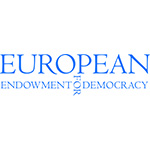 The European Endowment for Democracy (EED) is an independent, grant-making organisation, established in 2013 by the European Union (EU) and EU member states to foster democracy in the European Neighbourhood, Turkey, the Western Balkans, and beyond.
The European Endowment for Democracy (EED) is an independent, grant-making organisation, established in 2013 by the European Union (EU) and EU member states to foster democracy in the European Neighbourhood, Turkey, the Western Balkans, and beyond. EED supports civil society organisations, pro-democracy movements, civic and political activists, and independent media platforms and journalists working towards a pluralistic, democratic political system. EED is demand-driven and responds to the needs of local democracy actors, who may not be able to obtain funding otherwise.
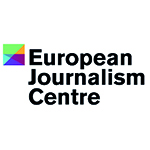 Journalists improve people’s lives through access to information, data and new perspectives. European Journalism Centre strengthens the resilience of European journalism by connecting journalists to new ideas, skills, people and funding. Their goal is that every journalist and news organisation benefits from a European Journalism Centre programme.
Journalists improve people’s lives through access to information, data and new perspectives. European Journalism Centre strengthens the resilience of European journalism by connecting journalists to new ideas, skills, people and funding. Their goal is that every journalist and news organisation benefits from a European Journalism Centre programme.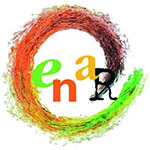 European Network Against Racism (ENAR). ENAR is the only pan-European network combining racial equality advocacy with building a strong network of anti-racist organisations across Europe. We ensure that laws and policies address racism and reflect the experiences of racialised people. We provide a unique space for members to connect and exchange strategies on how to combat racism, how to support our communities, and how to remain resilient.
European Network Against Racism (ENAR). ENAR is the only pan-European network combining racial equality advocacy with building a strong network of anti-racist organisations across Europe. We ensure that laws and policies address racism and reflect the experiences of racialised people. We provide a unique space for members to connect and exchange strategies on how to combat racism, how to support our communities, and how to remain resilient.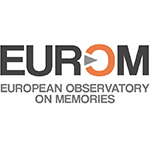 EUROM is a transnational network of institutions and organizations committed with the analysis and promotion of remembrance public policies. It aims to reflect on the recent history linked to the struggle for democracy and freedom in Europe, advocating for a plurality of memories. The Observatory is driven by the University of Barcelona Solidarity Foundation with the support of the European Union. The main goal of EUROM is to observe and analyse how memory policies are being developed in Europe and abroad iomn the frame of a multidisciplinary and transnational network. Its main objectives are to promote interdisciplinary research and academic activities related to the construction of public memory, contribute to the analysis and management of the politics of memory, and promote the right of citizens to use and interpret the memorial heritage.
EUROM is a transnational network of institutions and organizations committed with the analysis and promotion of remembrance public policies. It aims to reflect on the recent history linked to the struggle for democracy and freedom in Europe, advocating for a plurality of memories. The Observatory is driven by the University of Barcelona Solidarity Foundation with the support of the European Union. The main goal of EUROM is to observe and analyse how memory policies are being developed in Europe and abroad iomn the frame of a multidisciplinary and transnational network. Its main objectives are to promote interdisciplinary research and academic activities related to the construction of public memory, contribute to the analysis and management of the politics of memory, and promote the right of citizens to use and interpret the memorial heritage.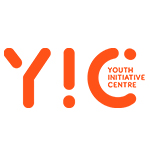 Gyumri “Youth Initiative Centre” NGO (YIC) was established in 2009 with the mission to raise the civic activism of youth and to contribute to their life quality through a youth-centred approach. YIC strives to make the voice of young people heard through youth initiatives and to open up new opportunities for development of young people and the community around them.
Gyumri “Youth Initiative Centre” NGO (YIC) was established in 2009 with the mission to raise the civic activism of youth and to contribute to their life quality through a youth-centred approach. YIC strives to make the voice of young people heard through youth initiatives and to open up new opportunities for development of young people and the community around them. From the beginning of its establishment YIC has focused its activities on youth and people who work with youth. The projects are carried out in accordance with the strategic activity directions of the organization which are as follows:
a) raising awareness on youth issues;
b) increasing youth competitiveness in the labour market and youth entrepreneurship development,
c) youth socialization and healthy lifestyle,
d) youth work and youth policy development,
e) youth initiatives and leadership promotion,
f) cultural diversity and cross-border dialogue, and
g) promotion of volunteering culture.
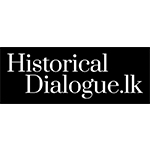 The organization historicaldialogue.lk is supported by Strengthening Reconciliation Processes in Sri Lanka (SRP), a programme jointly funded by the European Union and the German Federal Foreign Office. SRP partners with the Ministry of National Integration, Official Languages, Social Progress and Hindu Religious Affairs. The programme is implemented by Deutsche Gesellschaft für Internationale Zusammenarbeit (GIZ) GmbH and the British Council. Historical Dialogue.lk is based in Colombo and works on initiatives and approaches of memory and memorialization. Among the key activities currently, are the traveling history museum.
The organization historicaldialogue.lk is supported by Strengthening Reconciliation Processes in Sri Lanka (SRP), a programme jointly funded by the European Union and the German Federal Foreign Office. SRP partners with the Ministry of National Integration, Official Languages, Social Progress and Hindu Religious Affairs. The programme is implemented by Deutsche Gesellschaft für Internationale Zusammenarbeit (GIZ) GmbH and the British Council. Historical Dialogue.lk is based in Colombo and works on initiatives and approaches of memory and memorialization. Among the key activities currently, are the traveling history museum. Archive of Memory-A oral-history project, memory walks and matinee, university exchange programmes and supporting human rights archiving and related archive projects.
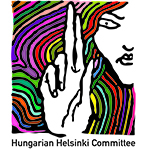 Hungarian Helsinki Committee is an civil society organization with a globally recognized reputation of human rights protection in Hungary and in Europe. Since 1989, we have been working towards a world in which everyone receives protection against human rights abuses. In the theory of change they focus our efforts:
Hungarian Helsinki Committee is an civil society organization with a globally recognized reputation of human rights protection in Hungary and in Europe. Since 1989, we have been working towards a world in which everyone receives protection against human rights abuses. In the theory of change they focus our efforts: • To defend the rule of law and a strong civil society in a shrinking democratic space;
• To defend the right to international protection against inhuman government policies and increasing xenophobia;
• To defend the rights of detainees and fairness in the criminal justice system.
Most issues they work on are not addressed by any other similar organization in Hungary and are particularly unpopular within Hungarian society. These make the HHC’s activities indispensable for a well-functioning democratic society. .
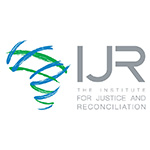 The Institute for Justice and Reconciliation is an African organisation that is known for: Building fair, democratic and inclusive societies. The Institute for Justice and Reconciliation enables African and global communities to promote reconciliation and to apply human-centred approaches to socio-economic justice. It was launched in the year 2000, in the wake of South Africa´s Truth and Reconciliation Commission. The aim was to ensure that lessons learnt from South Africa´s transition from apartheid to democracy were taken into account as the nation moved ahead.
The Institute for Justice and Reconciliation is an African organisation that is known for: Building fair, democratic and inclusive societies. The Institute for Justice and Reconciliation enables African and global communities to promote reconciliation and to apply human-centred approaches to socio-economic justice. It was launched in the year 2000, in the wake of South Africa´s Truth and Reconciliation Commission. The aim was to ensure that lessons learnt from South Africa´s transition from apartheid to democracy were taken into account as the nation moved ahead. Today, the Institute helps to build fair, inclusive and democratic societies in Africa through carefully selected engagements and interventions. It contributes to post-conflict stability, good governance and human security through programmes that promote political reconciliation and social and economic justice across Africa.
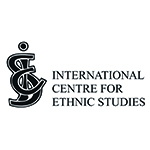 For 37 years, the International Centre for Ethnic Studies (ICES) has contributed to the world of ideas and has informed policy and practice through research, dialogue, the creative arts and other interventions.
For 37 years, the International Centre for Ethnic Studies (ICES) has contributed to the world of ideas and has informed policy and practice through research, dialogue, the creative arts and other interventions. The ICES has been an important player in the areas of reconciliation, justice, gender and human rights and has been particularly influential in shaping policy and public imagination on issues of gender equality, ethnic diversity, religious coexistence, and constitutional reform in Sri Lanka.
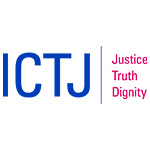 The International Center for Transitional Justice is an international non-profit organization specializing in the field of transitional justice. ICTJ works for justice in countries that have endured massive human rights abuses under repression and in conflict. They work with victims, civil society groups, national, and international organizations to ensure redress for victims and to help prevent atrocities from happening again. Transitional justice work unfolds in unique and most challenging of conditions, in societies shaped by widespread violence, polarized politics and fragile institutions, where they invest their knowledge, effort and commitment to help heal fractured communities and restore confidence in the rule of law.
The International Center for Transitional Justice is an international non-profit organization specializing in the field of transitional justice. ICTJ works for justice in countries that have endured massive human rights abuses under repression and in conflict. They work with victims, civil society groups, national, and international organizations to ensure redress for victims and to help prevent atrocities from happening again. Transitional justice work unfolds in unique and most challenging of conditions, in societies shaped by widespread violence, polarized politics and fragile institutions, where they invest their knowledge, effort and commitment to help heal fractured communities and restore confidence in the rule of law.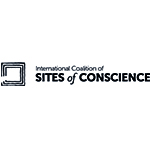 Founded in 1999, the International Coalition of Sites of Conscience is the only worldwide network of Sites of Conscience. With over 275 members in 65 countries, they build the capacity of these vital institutions through grants, networking, training, transitional justice mechanisms and advocacy. These members and partners remember a variety of histories and come from a wide range of settings – including long-standing democracies, countries struggling with legacies of violence, as well as post-conflict regions just beginning to address their transitional justice needs – but they are all united by their common commitment to connect past to present, memory to action.
Founded in 1999, the International Coalition of Sites of Conscience is the only worldwide network of Sites of Conscience. With over 275 members in 65 countries, they build the capacity of these vital institutions through grants, networking, training, transitional justice mechanisms and advocacy. These members and partners remember a variety of histories and come from a wide range of settings – including long-standing democracies, countries struggling with legacies of violence, as well as post-conflict regions just beginning to address their transitional justice needs – but they are all united by their common commitment to connect past to present, memory to action.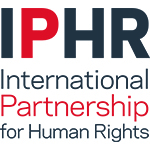 International Partnership for Human Rights (IPHR) is an independent, non-governmental organization founded in 2008. Based in Brussels, IPHR works closely together with civil society groups from different countries to raise human rights concerns at the international level and promote respect for the rights of vulnerable communities.
International Partnership for Human Rights (IPHR) is an independent, non-governmental organization founded in 2008. Based in Brussels, IPHR works closely together with civil society groups from different countries to raise human rights concerns at the international level and promote respect for the rights of vulnerable communities. IPHR is committed to promoting human rights worldwide. It acts to empower local civil society groups who are working to advance the protection of human rights in their respective countries and assists them with raising human rights concerns at the international level. In cooperation with partner organizations, IPHR advocates on behalf of individuals and communities who are among those most vulnerable to discrimination, injustice and human rights violations.
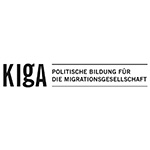 Political Education for the German multicultural society. Founded in 2003/04, the Kreuzberg Initiative against Anti-Semitism (KIgA), a registered non-profit organisation, was one of the first German civil society initiatives to develop education-based methods for dealing with anti-Semitism in a multicultural German society. They develop models for curricular and extra-curricular education tailored to the everyday reality of the young people they work with. Their focuses are anti-Semitism, past and present; the Israeli-Palestinian conflict; and political Islamism. Through education, they provide sensible and practical ways of confronting these issues. Their work is designed to target contemporary German society, formed as it is, by immigration.
Political Education for the German multicultural society. Founded in 2003/04, the Kreuzberg Initiative against Anti-Semitism (KIgA), a registered non-profit organisation, was one of the first German civil society initiatives to develop education-based methods for dealing with anti-Semitism in a multicultural German society. They develop models for curricular and extra-curricular education tailored to the everyday reality of the young people they work with. Their focuses are anti-Semitism, past and present; the Israeli-Palestinian conflict; and political Islamism. Through education, they provide sensible and practical ways of confronting these issues. Their work is designed to target contemporary German society, formed as it is, by immigration.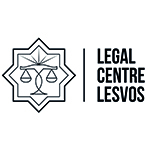 A small group of legally trained international volunteers based in Lesvos provide legal information and assistance to asylum seekers and migrants, whilst supporting Greek lawyers in their provision of legal advice and representation. The information that they collect whilst operating within the Legal Centre serves as a basis for press statements, human rights reports and legal strategies.
A small group of legally trained international volunteers based in Lesvos provide legal information and assistance to asylum seekers and migrants, whilst supporting Greek lawyers in their provision of legal advice and representation. The information that they collect whilst operating within the Legal Centre serves as a basis for press statements, human rights reports and legal strategies. While legal aid is essential, the important political actors within this ‘crisis’ are refugees themselves. They strive therefore not only to provide direct legal representation, but to work with refugee communities and support their organizing and advocacy efforts to realize their rights.
 Media Initiatives Center is a recognized player in the media community of Armenia in organizing training courses, supporting and carrying out media production and promoting media literacy for more than 20 years. They support freedom of expression, as well as establishment and development of independent media. They are involved in the improvement of media legislation and the protection of journalists’ rights. They aim to contribute to the diverse and harmonious development of the society, and strengthening of democratic values through creative and innovative development as well as dissemination of free and independent information.
Media Initiatives Center is a recognized player in the media community of Armenia in organizing training courses, supporting and carrying out media production and promoting media literacy for more than 20 years. They support freedom of expression, as well as establishment and development of independent media. They are involved in the improvement of media legislation and the protection of journalists’ rights. They aim to contribute to the diverse and harmonious development of the society, and strengthening of democratic values through creative and innovative development as well as dissemination of free and independent information.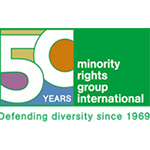 MRG is the leading international human rights organization working to secure rights for ethnic, religious and linguistic minorities and indigenous people around the world. The organisation campaigns worldwide with around 150 partners in over 50 countries to ensure that disadvantaged minorities and indigenous peoples, often the poorest of the poor, can make their voices heard.
MRG is the leading international human rights organization working to secure rights for ethnic, religious and linguistic minorities and indigenous people around the world. The organisation campaigns worldwide with around 150 partners in over 50 countries to ensure that disadvantaged minorities and indigenous peoples, often the poorest of the poor, can make their voices heard. Through training and education, legal cases, publications and the media and cultural programmes MRG support minority and indigenous people as they strive to maintain their rights – to the land they live on, the languages they speak, to equal opportunities in education and employment, and to full participation in public life.
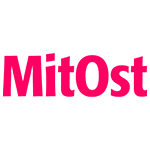 MitOst is a non-profit organisation that encourages activities and implements programmes that foster cultural exchange, active citizenship, social cohesion and sustainable urban and rural development with a geographical focus on the Eastern and Southern European Neighbourhood. MitOst has around 1,400 members in over 40 countries and functions as a network as well as a cooperation and implementing partner for various foundations and institutions active in civil society support.
MitOst is a non-profit organisation that encourages activities and implements programmes that foster cultural exchange, active citizenship, social cohesion and sustainable urban and rural development with a geographical focus on the Eastern and Southern European Neighbourhood. MitOst has around 1,400 members in over 40 countries and functions as a network as well as a cooperation and implementing partner for various foundations and institutions active in civil society support.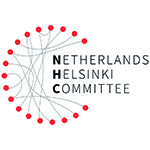 Established in 1987, the Netherlands Helsinki Committee (NHC) represented Dutch civil society in the Helsinki Process, following the development and agenda of the Organization for Security and Co-operation in Europe (OSCE). Since then, the NHC has been recognised as one of the key non-governmental organisations contributing to dialogue and cooperation among different types of actors around human rights issues. The three main themes of work for the NHC are Strengthening Civil Society, Securing Rule of Law, and Safeguarding Human Rights.
Established in 1987, the Netherlands Helsinki Committee (NHC) represented Dutch civil society in the Helsinki Process, following the development and agenda of the Organization for Security and Co-operation in Europe (OSCE). Since then, the NHC has been recognised as one of the key non-governmental organisations contributing to dialogue and cooperation among different types of actors around human rights issues. The three main themes of work for the NHC are Strengthening Civil Society, Securing Rule of Law, and Safeguarding Human Rights. The mission of the NHC is to build and secure justice and compliance with international human rights agreements within OSCE participating states. Throughout its history, the NHC has yielded concrete results as it has strengthened the capacity of civil society organisations and civil servants, lobbied and advocated on human rights and the rule of law, and actively participated in networks focused on these topics.
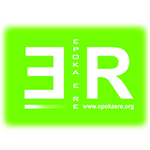 The organization works with youth and for youth. Its members are young people of Fier aged from 14 to 29. The centre opened in 2005 to address the need for youth to self organize and to become an active part of their community. New Epoch believes in the power of youth to act as agents for change in society. The goal of the organization is to aid the processes of social change, development, democratic progress, and improving the life of young people and the community through youth collaboration.
The organization works with youth and for youth. Its members are young people of Fier aged from 14 to 29. The centre opened in 2005 to address the need for youth to self organize and to become an active part of their community. New Epoch believes in the power of youth to act as agents for change in society. The goal of the organization is to aid the processes of social change, development, democratic progress, and improving the life of young people and the community through youth collaboration.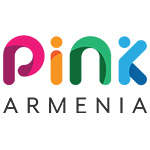 Pink Armenia was founded in 2007. Pink is a community-based LGBT (lesbian, gay, bisexual, trans) organization, it has been established by LGBT community, serves and supports the needs of the community, and promotes the LGBT persons’ human rights protection process and advocates for the change of public policy around LGBT issues.
Pink Armenia was founded in 2007. Pink is a community-based LGBT (lesbian, gay, bisexual, trans) organization, it has been established by LGBT community, serves and supports the needs of the community, and promotes the LGBT persons’ human rights protection process and advocates for the change of public policy around LGBT issues. Starting from its first day, Pink has initiated and implemented various activities and programs that have raised public awareness on sexual and reproductive health and rights, sexually transmitted infections, HIV/AIDS, their prevention, as well as actions that promote safe sexual relations and behavior. Subsequently, the activities of the organization and the provision of services expanded, including the issues of human rights and their protection in the organization’s agenda.
In the field of human rights protection, the organization provides a full range of services to LGBT community representatives whose rights have been violated on the basis of sexual orientation, gender identity and/or gender expression. Moreover, the organization represents the needs and interests of LGBT people, as well as advocates for solutions and legal protection of these issues at local, state and international levels.
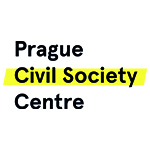 The Prague Civil Society Centre works to empower and support civil societies across Eastern Europe and Central Asia. They believe that civil society is the key driver of social change and progress across the region. They want their support to help realise that change, by enabling civic groups to connect with their communities and improve people’s lives.
The Prague Civil Society Centre works to empower and support civil societies across Eastern Europe and Central Asia. They believe that civil society is the key driver of social change and progress across the region. They want their support to help realise that change, by enabling civic groups to connect with their communities and improve people’s lives.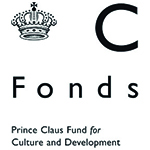 The Prince Claus Fund was established on 6 September 1996 as a tribute to HRH Prince Claus's dedication to culture and development. Since then, the Fund has created opportunities for connection and exchange and stimulated cultural expression, primarily in Latin America, Africa, Asia, the Caribbean and Eastern Europe. They protect cultural heritage by providing ‘first aid’ to rescue heritage threatened by man-made or natural disasters. They support innovative, high-quality cultural initiatives through grants and mentoring, especially where opportunities are limited, whether by poverty, conflict, marginalisation or political repression. They create networks of exchange. The many participants in their networks are partners of the Fund who advise them in their work, often while learning from and inspiring each other. Prince Claus Fund is supported by the Dutch Ministry of Foreign Affairs, the Dutch Postcode Lottery, and private individuals and corporations. They also collaborate with like-minded organisations on joint calls for proposals.
The Prince Claus Fund was established on 6 September 1996 as a tribute to HRH Prince Claus's dedication to culture and development. Since then, the Fund has created opportunities for connection and exchange and stimulated cultural expression, primarily in Latin America, Africa, Asia, the Caribbean and Eastern Europe. They protect cultural heritage by providing ‘first aid’ to rescue heritage threatened by man-made or natural disasters. They support innovative, high-quality cultural initiatives through grants and mentoring, especially where opportunities are limited, whether by poverty, conflict, marginalisation or political repression. They create networks of exchange. The many participants in their networks are partners of the Fund who advise them in their work, often while learning from and inspiring each other. Prince Claus Fund is supported by the Dutch Ministry of Foreign Affairs, the Dutch Postcode Lottery, and private individuals and corporations. They also collaborate with like-minded organisations on joint calls for proposals.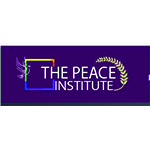 The mission of The Peace Institute is to pursue international peace through education and leadership initiatives for positive social change with an emphasis on individual empowerment, human rights, interfaith dialogue, and transforming the social and economic conditions of women, youth, and vulnerable populations. The Peace Institute brings together academics, politicians, religious leaders, and more to examine theories and strategies that specifically impact youth and women. Mothers Without Borders expands upon current work and research, addressing violent extremism and youth radicalization.
The mission of The Peace Institute is to pursue international peace through education and leadership initiatives for positive social change with an emphasis on individual empowerment, human rights, interfaith dialogue, and transforming the social and economic conditions of women, youth, and vulnerable populations. The Peace Institute brings together academics, politicians, religious leaders, and more to examine theories and strategies that specifically impact youth and women. Mothers Without Borders expands upon current work and research, addressing violent extremism and youth radicalization.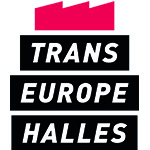 Trans Europe Halles (TEH) is a Europe-based network of independent cultural centres initiated by citizens and artists with 127 members and associates in 36 countries.
Trans Europe Halles (TEH) is a Europe-based network of independent cultural centres initiated by citizens and artists with 127 members and associates in 36 countries. TEH has been at the forefront of repurposing Europe’s industrial buildings for arts, culture and activism since 1983. Their mission is to facilitate the sustainable development of civil-society initiated cultural and creative organisations based in repurposed spaces, by connecting and supporting them. They facilitate international cooperation and provide opportunities for learning and sharing. To achieve this, they organise two international meetings every year, coordinate international projects, run a professional Capacity Building Programme, support their members in times of troubles and actively influence cultural policies.
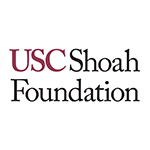 USC Shoah Foundation develops empathy, understanding and respect — through testimony.
USC Shoah Foundation develops empathy, understanding and respect — through testimony. In recording audiovisual testimonies of survivors and eyewitnesses of the Holocaust, genocide, and crimes against humanity, they give voice to survivors and share their life histories and experiences with the world. They listen deeply, consider carefully, and place testimony in context. Through academic programs and research, they build knowledge and insight. Their education programs deliver practical digital tools and resources for foundation’s partners and audiences.
The Institute’s efforts are rooted in the Visual History Archive, a repository containing 55,000 testimonies of survivors and witnesses to genocide and crimes against humanity. Conducted in 63 countries, the testimonies average a little more than two hours each in length. The Visual History Archive contains more than 115,000 hours of testimony — the equivalent of 13 years.
The Institute also has branched into the realm of alternate reality, inventing an interactive-biography project called Dimensions in Testimony. The project — the first of its kind in the world — enables people to have question-and-response sessions with pre-recorded video testimonies of genocide survivors. In so doing, it offers a way to preserve the ability to have real-time conversations with some of the world’s most effective teachers of tolerance. The Institute also develops education programs for middle and high school students, and has produced several award-winning documentary films – two of which were filmed in 360-degree virtual reality.
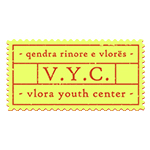 VYC is a non-profit organization registered as an association in 12 November 2002, active in the region of Vlora. It contributes to the empowerment of the community, especially youth, through implementation of education, awareness, and advocacy programs for the promotion of human rights, democracy, and voluntarism. The organization helps shape community leaders of the future, agents of positive change and development of democratic values.
VYC is a non-profit organization registered as an association in 12 November 2002, active in the region of Vlora. It contributes to the empowerment of the community, especially youth, through implementation of education, awareness, and advocacy programs for the promotion of human rights, democracy, and voluntarism. The organization helps shape community leaders of the future, agents of positive change and development of democratic values.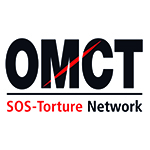 OMCT was created in 1985, the World Organisation Against Torture (OMCT) is today the main coalition of international non-governmental organisations (NGO) fighting against torture, summary executions, enforced disappearances and all other cruel, inhuman or degrading treatment.
OMCT was created in 1985, the World Organisation Against Torture (OMCT) is today the main coalition of international non-governmental organisations (NGO) fighting against torture, summary executions, enforced disappearances and all other cruel, inhuman or degrading treatment. Based in Geneva and in Brussels, the OMCT’s International Secretariat provides personalized medical, legal and/or social assistance to hundreds of torture victims and ensures the daily dissemination of urgent interventions across the world, in order to protect individuals and to fight against impunity. Specific programmes allow it to provide support to specific categories of vulnerable people, such as women, children and human rights defenders. In the framework of its activities, OMCT also submits individual communications and alternative reports to the special mechanisms of the United Nations, and actively collaborates in the respect, development and strengthening of international norms for the protection of human rights. OMCT also works with the EU and its institutions.
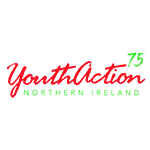 YouthAction Northern Ireland is a membership-based youth work and arts charity, with a 75 year history of working with young people to tackle inequalities in their lives; improve their life chances; inspire them as activists; and contribute to flourishing communities in a peaceful and shared society.
YouthAction Northern Ireland is a membership-based youth work and arts charity, with a 75 year history of working with young people to tackle inequalities in their lives; improve their life chances; inspire them as activists; and contribute to flourishing communities in a peaceful and shared society. Their goals are:
• Ensure YouthAction Northern Ireland operates to the highest governance standards, within a clear constitutional and legal framework.
• Strive for a sustainable and robust financial base for the work of the charity.
• Inspire leadership, learning and growth in staff and volunteers to maximise their contribution to our charity and society.
• Raise quality standards in youth work through partnerships, research, training, resource development and demonstrating impact, to influence a flourishing youth sector.

This project is funded by the European Union.
